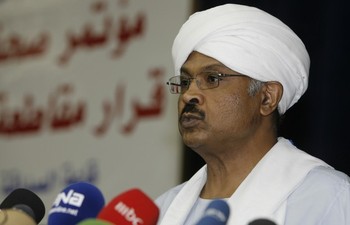Sudan’s opposition dismiss VP Taha’s call for dialogue as political maneuver
March 27, 2013 (KHARTOUM) – A day after Sudan’s 1st Vice President Ali Osman Taha made a call on rebels and opposition alike to renounce violence and agree to dialogue, doubts were cast over the motives behind it and whether it was genuine or not.

Taha said that “President Al-Bashir who I knew is sincere in his words”, asserting that the final decision on Al-Bashir’s political future will be determined by the institutions of the ruling National Congress Party (NCP) and the Sudanese people.
Al-Fadil said in a statement sent to Sudan Tribune on Wednesday that the country is “torn apart” and the Sudanese blood is “heavily flowing” and stressed there is no time for “maneuvering and deception”.
The opposition figure called on Bashir to stop the bloodshed and hand over power to a transitional government backed by the Sudan Armed Forces (SAF). The interim government, according to al-Fadil, should be responsible for holding a constitutional conference which will bring an end to the civil war and offer a framework for solving Sudan’s governance crisis.
He said that Taha presented himself as a savior of the country when he called the opposition forces to participate in the dialogue over a new constitution as if he wasn’t responsible for the humanitarian, political and economic crisis which has befallen in the country under this regime which he said is to blame for the secession of South Sudan as well as war crimes and genocide in Darfur.
Al-Fadil accused the government of impoverishing and humiliating Sudanese people as well as weakening the army, adding that Taha’s call for national dialogue lacks credibility because it comes at a time when the opposition leaders and political activists are stuck in prisons and detention centers only because they participated in a national dialogue conference on the future of governance and how to achieve peace in Sudan.
He was referring to the ‘New Dawn’ charter of which he was a signatory earlier this year in Uganda that infuriated the NCP over clauses related to preventing exploitation of religion in political activities and restructuring state institutions.
Several figures which took part in the signing were swiftly arrested upon their return to Khartoum and remain in detention.
Taha had suggested that as relations with the South improve there is a less restrictive political atmosphere within Sudan
“We don’t see anything new in that. It is the same line,” Farouk Abu Issa, who heads the opposition alliance called the National Consensus Forces (NCF) of more than 20 parties told Agence France Presse (AFP) in Khartoum.
Bashir Adam Rahma, foreign relations secretary of the Popular Congress party (PCP), told same news agency that the government “junta” has a history of calling for dialogue “on their own terms”.
Rahma said opposition wants to be part of a “transitional administration” which would include rebels and the NCP.
Taha also called on leaders of the Sudan people Liberation Movement North (SPLM-N) Malik Agar and Abdulaziz al-Hilu fighting Khartoum in Blue Nile and South Kordofan states to take part in drafting the new constitution.
Sudan has been strongly resisting regional and international pressure to negotiate with SPLM-N rebels, calling its leaders outlaws and issuing arrest warrants for them.
But this month Sudanese officials expressed readiness to sit down with SPLM-N on the basis of the 2005 Comprehensive Peace Agreement (CPA).
(ST)
